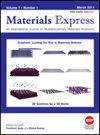Soft intercalated slope stability optimization with a modified polymer curing agent
IF 0.7
4区 材料科学
Q3 Materials Science
引用次数: 0
Abstract
The demand for high-grade roads is significantly higher in developing countries. However, slopes containing coal gangue weak interlayer pose significant safety risks to highways, railways, and other infrastructures. To address this issue, this study aims to find the best polymer cement ratio scheme of traditional pure acrylic emulsion polymer curing agents. Based on this scheme, a reinforcement method was designed, which combined modified polyvinyl acetate with the coal gangue soft interlayer. The slope test results using a rigid model box showed that the shear strength of the root–soil composite in the PVAC group was higher than that in the pure acrylic emulsion group under different vertical consolidation pressures. Over time, the cumulative soil loss rate of the pure acrylic emulsion group gradually increased, and the soil pH decreased. Conversely, the PVAC group showed minimal changes in these two indicators with time. Under the same conditions, the slope shear strength of the PVAC group remained stronger than that of the pure acrylic emulsion group. The standard deviations of multiple tests for the PVAC group and pure acrylic emulsion group, under a vertical consolidation pressure of 100 kPa, were 7.2 kPa and 9.2 kPa, respectively, indicating greater stability in the PVAC group. With a stability coefficient of 3.39, which surpasses that of the pure acrylic emulsion group, the PVAC group exhibited enhanced slope stability. These results indicate that this method can effectively enhance the stability of coal gangue soft interlayer slopes without causing environmental pollution.使用改性聚合物固化剂优化软插层斜坡稳定性
发展中国家对高等级公路的需求要高得多。然而,含煤矸石弱夹层的边坡对公路、铁路等基础设施构成了重大的安全隐患。针对这一问题,本研究旨在寻找传统纯丙烯酸乳液聚合物固化剂的最佳聚合物水泥比方案。在此基础上,设计了改性聚醋酸乙烯与煤矸石软夹层相结合的加固方法。刚性模型箱边坡试验结果表明,在不同竖向固结压力下,PVAC组根土复合材料的抗剪强度高于纯丙烯酸乳液组。随着时间的推移,纯丙烯酸乳液组的累积土壤流失率逐渐增大,土壤pH值逐渐降低。相反,随着时间的推移,PVAC组在这两个指标上的变化很小。在相同条件下,PVAC组的边坡抗剪强度仍高于纯丙烯酸乳液组。垂直固结压力为100 kPa时,PVAC组和纯丙烯酸乳液组的多次试验标准差分别为7.2 kPa和9.2 kPa,说明PVAC组的稳定性更强。稳定性系数为3.39,优于纯丙烯酸乳液组,表现出较好的边坡稳定性。结果表明,该方法可有效提高煤矸石软弱夹层边坡的稳定性,且不造成环境污染。
本文章由计算机程序翻译,如有差异,请以英文原文为准。
求助全文
约1分钟内获得全文
求助全文
来源期刊

Materials Express
NANOSCIENCE & NANOTECHNOLOGY-MATERIALS SCIENCE, MULTIDISCIPLINARY
自引率
0.00%
发文量
69
审稿时长
>12 weeks
期刊介绍:
Information not localized
 求助内容:
求助内容: 应助结果提醒方式:
应助结果提醒方式:


